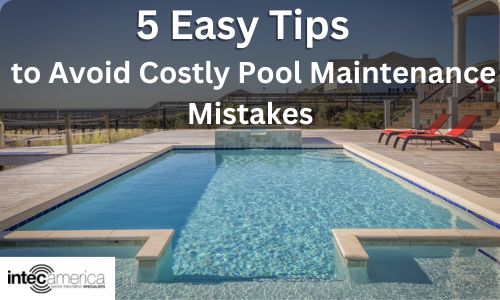Owning a pool is a joy, but improper maintenance can quickly turn it into a headache. From murky water to costly equipment repairs, pool owners often face common issues that arise from overlooked care. In this guide, we will share 5 easy pool maintenance tips to help you avoid expensive mistakes and keep your pool clean, safe, and cost-efficient.

Tip 1: Clean Your Pool Regularly
Regular cleaning is the foundation of good pool care. Skimming leaves and debris, brushing pool walls, and vacuuming the floor prevents clogging of dirt, algae, and stains. Neglecting these steps can clog filters, affect water circulation, and create long-term damage.
Quick Tip: Aim to clean your pool at least once a week to maintain water clarity and avoid costly professional cleanings down the road.
Tip 2: Balance Water Chemistry
Balanced water chemistry is vital for a healthy pool. Regularly check and adjust pH, alkalinity, and calcium hardness levels:
- pH: 7.2-7.6 (7.0-7.4 for an ionized pool)
- Alkalinity: 80-120 ppm (60-80 for an ionized pool)
- Calcium Hardness: 200-400 ppm
Unbalanced water can cause issues like:
- Scaling: Excess calcium buildup on pool surfaces.
- Corrosion: Damaging pool equipment like pumps and heaters.
For an effective, low-maintenance alternative to chemical treatments, consider copper ionization. Copper ions act as natural algaecides and bactericides, helping you control algae and bacteria growth without relying on harsh chlorine or frequent chemical adjustments.
Tip 3: Avoid Overusing Pool Chemicals
Many pool owners fall into the trap of overusing chemicals, especially chlorine. While chlorine is commonly used to sanitize pools, excessive amounts can:
- Irritate eyes and skin.
- Damage pool liners and equipment over time.
- Lead to harmful chemical imbalances.
Switching to a copper ionizer reduces the need for chlorine, offering a safer, more sustainable solution. Copper ionization naturally keeps pool water clean and clear while reducing maintenance costs and chemical dependency.
Pro Tip: By opting for copper ionization, you’ll save money on pool chemicals and enjoy healthier water for your family.
Read more about Chlorine Free Pools
Tip 4: Maintain Your Pool Equipment
Your pool’s equipment, like pumps, filters, and heaters, plays a critical role in water circulation and cleanliness.
- Weekly Maintenance: Check for clogs, clear debris to confirm systems are running efficiently.
- Seasonal Checks: Inspect seals, hoses, and motors for wear and tear.
Neglecting pool equipment can result in costly repairs or even replacements. Regular care ensures everything operates smoothly, extending the life of your pool system.
Tip 5: Prevent Pool Damage During Off-Season
Properly closing your pool for the off-season is essential to prevent costly damage, especially during winter months. Here’s how you can prepare:
- Clean and Balance Water: Ensure pH and chemical levels are stable before closing.
- Lower the Water Level: Prevent damage caused by freezing water.
- Use a Durable Pool Cover: Protect against debris, ice, and harsh weather.
For long-term water quality during the off-season, copper ionization is an excellent solution. It helps prevent algae growth throughout winter with minimal effort, helping an easier opening come spring.
Conclusion
Maintaining your pool doesn’t have to be expensive or complicated. By following these 5 easy tips—regular cleaning, balanced water chemistry, proper equipment care, chemical moderation, and seasonal maintenance—you can avoid costly pool maintenance mistakes.
Switching to sustainable solutions like copper ionization not only simplifies pool care but also reduces long-term expenses while keeping your water clean and safe for your family.
Ready to save time and money on pool maintenance? Explore our copper ionization systems and enjoy a cleaner, healthier pool all year round!
Contact us today to learn more!
FAQ’s
Q.) How often should I clean my pool to prevent maintenance issues?
Ans. You should clean your pool at least once a week. This includes skimming debris, brushing pool walls, and vacuuming the floor. Regular cleaning prevents algae accumulation, staining, and filter clogs that can lead to expensive repairs.
Q.) How often should pool filters be replaced or cleaned?
Ans. Cartridge filters should be cleaned every 2-4 weeks and replaced annually, depending on usage. Sand and DE filters need backwashing or cleaning every 1-3 months.
Q.) Can hard water cause damage to my pool, and how can I fix it?
Ans. Yes, hard water can lead to calcium deposit on pool surfaces and equipment. Regularly testing calcium hardness and using treatments like water softeners can help manage this issue.
Q.) Is it safe to drain my pool completely for cleaning or maintenance?
Ans. Draining a pool should be done with caution. In some cases, it can damage the pool structure. Consult a pool professional before draining, and avoid doing so in extreme heat or when the ground water table is high.
Recent Blog Posts
- https://www.intec-america.com/blog/pool-closing-checklist-everything-you-need-to-know/
- https://www.intec-america.com/blog/eco-friendly-pool-care-with-non-toxic-solutions/
- https://www.intec-america.com/blog/why-keeping-your-pool-alkalinity-balanced-is-crucial/
- https://www.intec-america.com/blog/how-to-identify-and-fix-common-pool-leaks/
- https://www.intec-america.com/blog/choosing-the-right-pool-liner/
- https://www.intec-america.com/blog/pool-shock-treatment-the-risks-and-how-to-avoid-them/
- https://www.intec-america.com/blog/pool-sanitizer-vs-shocks/
- https://www.intec-america.com/blog/pool-maintenance-101-everything-you-need-to-know/


